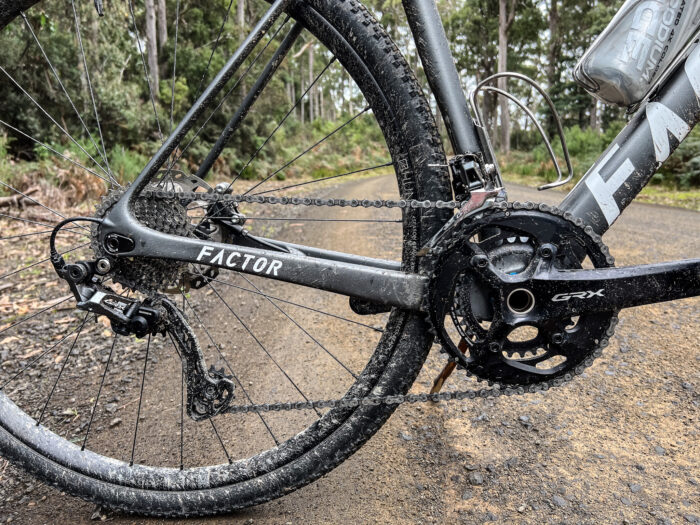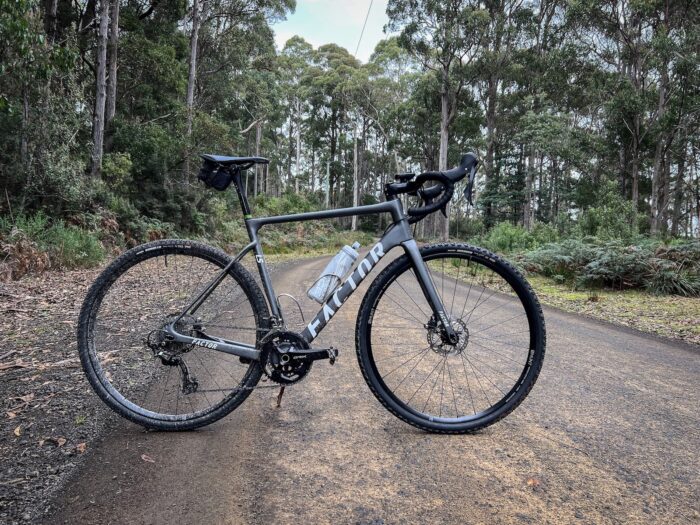Here at MarathonMTB.com we’ve realised there is a lot of crossover between the training, racing, and outlook of marathon events and gravel events. And that’s why along with Justin Morris and Imogen Smith, I’m mixing in a few gravel events this year. Having used a Norco Threshold for cyclocross racing, road racing, training and gravel things for a few years, 2023 saw a chance to shift to a gravel bike and group set. The Factor LS was a standout choice for me due to low weight and only a mild geometry shift from the Norco I had been on.
The Devil’s Cardigan is now celebrating its third year of running in Tasmania. The gravel race is run as close to the winter solstice as possible, to make it a bloody tough event in a Tasmanian winter – it is just part of their brand! This year the event also has the Australian National Gravel Championships attached to it. While a national title can be a poisoned chalice for a long-standing marathon event, it seems to have really helped to boost awareness of ‘the Cardigan’ with over 400 riders entered.
A closer look at the Factor LS
In my mind the Factor LS is soimewhere between an all-road bike and an Australian gravel bike. A lot of our gravel riding in Australia is pretty rough and tumble, although some areas are gifted with high quality champagne gravel. Compared to some gravel bikes on the market, such as the Trek Checkpoint which is a battleship, the LS has a little less tyre clearance, plus a shorter length and wheelbase, and lower front end. The advantages are low weight and nimble handling on fast terrain, where the Checkpoint feels sluggish. But on steep, fast descents that are riddled with holes and ruts – a bike like the Checkpoint has an advantage. The Cardigan has 2300m of climbing, and this year the opening climb and descent is far tamer than the first two years – advantage Factor LS.
Drivetrain – Shimano GRX
I bought a 2×11 Shimano GRX drivetrain for this build. Regardless of this event, the gravel rides I tend to do are hilly, and I tend to own one drop bar bike for road and gravel – so 2×11 makes sense to me. Coming off an Ultegra 11sp Di2 group, I miss the electronic shifting and getting used to the lever throw took a little while. But I love having a clutch rear mech for offroad use.

I have 160mm XTR rotors front and rear, stock pads (that may be swapped out to metallic) and 172.5mm cranks with 31/48 chain rings. There’s a 11-34 cassette in the back. I’d happily run an 11-36 but this is what was available in the group I bought.
Cockpit and contact points
Factor supplied a one-piece Black Inc bar and stem, with a 100mm reach and 42cm width. In hindsight I should have opted for something with a flared drop. My previous bike didn’t have this, but I think I do prefer it for stability on descents. I used Cinelli black cork tape – as it works. The hoods are set just above horizontal and are not angled inwards as if the bike has fallen over at a cafe, on each side.
The conditions are wet, and I may fit an Orucase HC bar bag on with dry gloves, buff and layer of some kind. There are bag drops but I feel I’m here to survive, and would rather have these items on hand.
The seatpost is an inline Black Inc carbon post, with a Pro Stealth Carbon saddle fitted. I like this saddle shape, including the cut out, and use the non-carbon model on most bikes. I have an Orucase saddle bag fitted with 2 gravel tubes, a Park Tool tyre boot and a tyre lever. I checked both tubes aren’t abraded away earlier this week. It pays to be prepared!
While some riders use road shoes and pedals on gravel, I’m happy with SPDs. As such I have Shimano XT M8000 race pedals fitted. They’re probably a few years old but along with M540 pedals, they are some of the most reliable and consistent XC-style clipless pedals I have used.
I’ll have a Bike Bag Dude top tube bag fitted for snacks, if I’m racing in a rain jacket – which seems likely!
Wheels and tyres
My take on gravel wheels is it is best to mimic the wheel system of an XC/marathon bike more than a road bike. This is my choice to suit my weaknesses. Others have different preferences. So this means I prefer a wider rim that is also shallower. It can end up lighter for most wheel sets. I also run tyre inserts and prefer to go as wide as possible. The Factor LS has a 40mm limit (42mm for some tyres) while their Ostro Gravel has a 45mm limit.
I am using Hunt CX Wide 4-season wheels. They’re a couple of years old, but have nice bearings, and alow profile alloy rim with a 25mm internal width. I have Rimpact CX tyre liners fitted. This isn’t an overly light setup, but it was on hand and works. Imogen Smith is using a new EIE carbon wheel set with 25mm internal, 30mm depth, and on DT Swiss 350 hubs with Sapim CX ray spokes – they weigh 1250g. She’s also using Tubolight tyre liners that are a hair under 40g each.
I have a Maxxis Ravager on the front, which has been on there for at least a year and measures 44mm! This one has an EXO casing with 120 tpi, so is a little more supple while still strong.
On the rear I have a new Maxxis Rambler 40mm in Silkshield, which is 60tpi. It’s a little heavier but also stronger – and a faster rolling tread pattern. A Ravager was fitted but as it had blown out to 44mm, it didn’t really clear the frame.
This wheel set is way less choppy than some superlight, deeper carbon wheels, and that improves comfort and traction, and therefore speed. On smooth gravel routes then an aero wheel may have an advantage – but I think tuning your wheel system is key for confidence on gravel where your contact patch is so much less than with a mountain bike wheel system.
My take on the Factor LS
It’s fast. The bike is really rigid out of the saddle, and I knocked off a loop from Linville to Nanango and back on the weekend at over 25kmh, which surprised me. The feel of the bike blurs the lines between road bike agility and gravel ability, and to race the Devil’s Cardigan that may well be perfect. However, this course is a brute, and with 60mm of rain overnight and more coming, the 108km route will likely be impacted by who can manage their equipment in the conditions. I’ll be riding for a finish, and if I can be in a position to make that a little more competitive in the back half – then I’ll see what I can do.
Got some questions – drop them in a comment!

